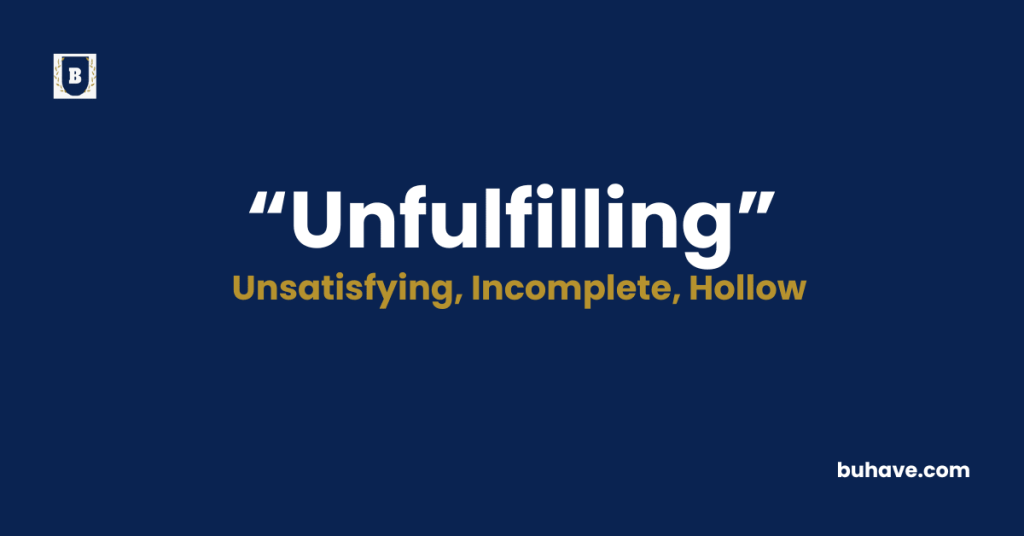The word Unfulfilling (adjective) describes something that fails to satisfy your needs, desires, or expectations, often leaving you feeling empty or disappointed. In this guide, you’ll learn the full definition, synonyms, antonyms, etymology, and real-life examples of how to use Unfulfilling correctly in sentences.
Unfulfilling Explained in Depth
A complete and detailed guide to the word Unfulfilling including meaning, definition, examples, etymology, synonyms, and antonyms.
Meanings of Unfulfilling
Unfulfilling means failing to provide satisfaction, meaning, or a sense of accomplishment. It often describes jobs, relationships, or experiences that leave you feeling unmotivated or disappointed. For example, a job that offers no room for growth can be unfulfilling.
Definition
Unfulfilling refers to the quality of something that does not meet your emotional, mental, or physical needs, leading to a sense of dissatisfaction or emptiness. It highlights the lack of personal reward or purpose in an activity or experience.
Etymology
The word unfulfilling comes from the prefix “un-” meaning “not” and the verb “fulfill,” which derives from Middle English “fulfyllen” meaning “to fill up, satisfy.”
Over time, “unfulfilling” evolved to describe anything that leaves you feeling unsatisfied or incomplete.
Example Sentences
- She found the repetitive tasks at her job unfulfilling.
- Many people consider a lack of meaningful relationships to be unfulfilling.
- The movie was unfulfilling because it lacked a satisfying ending.
Unfulfilling Synonyms
- Unsatisfying
- Disappointing
- Empty
- Dissatisfying
- Unrewarding
- Uninspiring
- Hollow
- Incomplete
- Unrewarding
- Flat
Unfulfilling Antonyms
- Fulfilling
- Rewarding
- Satisfying
- Enriching
- Meaningful
- Gratifying
- Inspiring
- Uplifting
- Purposeful
- Engaging
FAQs about Unfulfilling
Here are some frequently asked questions (FAQs) about the word “Unfulfilling”
What does “unfulfilling” actually mean?
“Unfulfilling” means something that fails to satisfy or meet your needs or expectations, leaving you feeling disappointed or empty.
Is “unfulfilling” always negative?
Yes, it always carries a negative tone, highlighting a lack of satisfaction or meaning.
Can “unfulfilling” describe relationships?
Absolutely. Relationships that lack connection, purpose, or emotional support can be unfulfilling.
How is “unfulfilling” different from “disappointing”?
“Unfulfilling” focuses on a lack of deep satisfaction or purpose, while “disappointing” often refers to a specific letdown or failure to meet expectations.
Is “unfulfilling” commonly used in everyday conversation?
Yes, it’s commonly used to describe jobs, experiences, and relationships that leave people feeling empty or unmotivated.

















